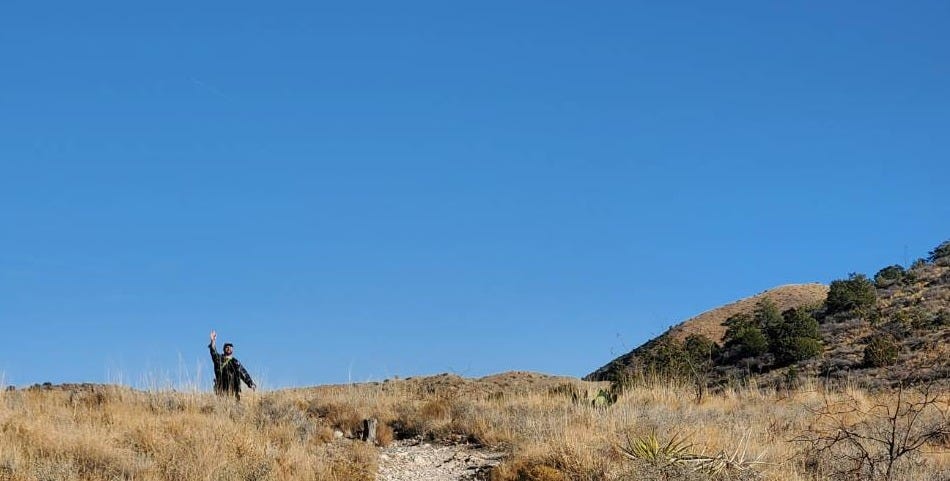Welcome to desert dispatch, a little newsletter about a lot of different things. As a reading experience, desert dispatch is about “microdosing” different topics, including history, culture, philosophy, and everything in between; all from my perspective here in the great American Southwest. This issue does some heavy lifting as it looks back at 2024, shares some cultural asides, and looks forward to 2025.
Housekeeping
If you’ve received desert dispatch emails offering membership discounts (or anything except newsletters like this one) please know that it is not me, but an automated function of Substack. It’s also one I will disable once I find out how. Every newsletter in its entirety is free and always will be. While being a paid subscriber is appreciated (really!), I will always keep desert dispatch free.
2024: In Review
First off: A Merry Christmas and a Happy New Year! It’s rote to get these kinds of messages via email nowadays, but I mean it all the same. Thank you for subscribing and reading.
Since launching desert dispatch on December 20, 2023 I’ve “dispatched” 23 unique newsletters — this one is technically number 24. As a fun bit of data, those 23 newsletters combined comes to just over 27,000 words.
Those 27,000 words have been used to tell about strange happenings in the desert, homelessness, Nikki Haley’s views about slavery, my lifelong love of Blues music, and my adventures following the San Diego Padres around southern California in October (with Debbie P.). I also shared the occasional poem.

Cultural metabolization
I don’t like the word consumed in a cultural context — I prefer metabolized. Consuming something implies destruction: I took it, I consumed it, it is gone. You read a book, laugh at a meme, watch a movie, admire a painting; the experience has changed you, even if only minutely, but the thing itself still exists. You didn’t consume it, because it’s still there.
Metabolizing something, like culture, is different and a more appropriate descriptor. When you metabolize something, you integrate it. Whenever we "absorb” or “imbibe” a cultural thing, what we’re doing is mixing it with everything we’ve absorbed or imbibed before it.
When we watch a movie, we’re placing that movie into the context of every other movie we have seen before it. If I watch Mr. Baseball, starring Tom Selleck, I metabolize it and place it in the context of other baseball movies, films made in the early 1990s, stories set in Japan, or of similar “fish out of water” tales. I remember a scene where the titular “Mr. Baseball” smokes a cigar in a Japanese train, and recognize how it was a faux pas both in the film and would be so in real life — then and now. I compare his experience visiting Japan to my own, as well as other trips abroad where I took part in a faux pas or two (usually by accident) and was always a “fish out of water.” I then compare and contrast those experiences. Maybe I think about Selleck the actor in the context of the films and TV shows he did around Mr. Baseball. Maybe I remember the first time I watched it (as a kid with my aunt and uncle) and compare that viewing experience to when I watched it again, this time as an adult with my wife. Essentially, I watch Mr. Baseball and metabolize it, letting the figurative nutrients spread out to any number of other things with various degrees of similarity and connection. One experience gives birth to a hundred others.

Now Dig This: Music Edition
Back in January I had plans for “Now Dig This” to be a recurring feature where I share cultural bits and bobs that you might also enjoy — books, movies, essays, music, etc. That didn’t quite happen, but to finish out 2024 here are some of the tunes I’ve been jamming to.
This past December has been all about folk music, specifically from or influenced by the Canadian Maritimes. Canada has a rich folk scene, some of which successfully spilled over into the US during the 20th Century — think Gordon Lightfoot, Leonard Cohen, Joni Mitchell. Two artists, Stan Rogers and his son Nathan Rogers, have been on repeat. If neither of those names sound familiar, then I’d recommend Stan’s “The Flowers of Bermuda” and “Northwest Passage”, the second is considered an unofficial Canadian national anthem; for Nathan, the one-two punch of “Mary’s Child” and “The Jewel of Paris.” Nathan’s two songs can be enjoyed independently, but tell one cohesive story about a 17th Century Huron boy taken from the woodlands of Canada and raised to adulthood in Louis XIV’s court. Despite the heavy-sounding nature of that subject matter, neither song is a work-out. I promise.
A few other tunes (making the rotation in my “Current Folk Obsessions” playlist) that I recommend include:
“Dominion of the Sword” by Melrose Quartet (original by Martin Carthy)
“Back Home in Derry” by Scythian
“Stick to the Craythur” by The Green Fields of America
“Dogger Bank” by The Teacups
2025: Looking Forward
Without making too many assumptions or carving too many things in stone, I think your email in 2025 is going to see an uptick in desert dispatch newsletters. A lot of the growing pains this past year were internal, as opposed to external, and have been figured out — or rather, metabolized.
What that means is that you’ll see more individual newsletters (like this) covering an array of topics with more short-form content; newsletters will feature extracts from longer-form essays that I will then post to my website. The newsletter will function as an appetizer and if a particular longer-form essay doesn’t appeal (based off the extract) then you can just scroll past it. The website will, in turn, see more regular content updates.
There will also be more photography! For whatever reason, my photos seem to be as popular as my writings — hey, you’ll get no complaints from me. Take care and I’ll see you all in 2025.




